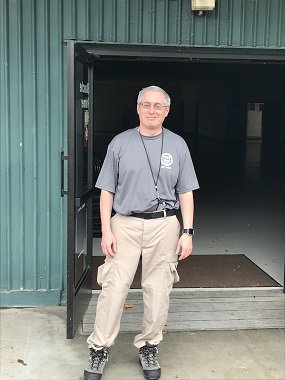A Doctor and His Suitcase

DETROIT – As a member of Michigan’s Disaster Medical Assistance Team, Henry Ford Hospital emergency medicine physician Howard Klausner, M.D., knows that a call for deployment to a disaster can come at the most inopportune time. Special family occasions, vacation planning, holidays are all at risk of being disrupted for these highly skilled volunteer medical providers and support personnel. It’s why Dr. Klausner keeps a suitcase at the ready.
Dr. Klausner and his wife had been planning for their annual Thanksgiving dinner when the call for medical support came from the National Disaster Medical System during the Camp Fire wildfire in California. The fire, which began Nov. 8 and was fully contained by Nov. 25, killed at least 85 people and devastated the town of Paradise, destroying nearly 14,000 homes, more than 500 commercial buildings and more than 4,000 other structures, according to the California Department of Forestry and Fire Protection.
“When you get to these disaster sites, you realize early on that for a little bit of sacrifice on our end, you are really making a difference for the individuals you are helping,” says Dr. Klausner, whose previous deployments include Hurricane Irma and Maria, 9/11 in New York and Hurricane Katrina in New Orleans.
Dr. Klausner and the Michigan team worked Nov. 18-27 at a makeshift evacuation center set up by the American Red Cross at the Yuba-Sutter Fairgrounds, about 40 miles south of Paradise. Working 12-hour shifts, the team treated a small number of evacuees for respiratory complaints, minor injuries and gastroenteritis and provided basic medications. About 250 evacuees were housed at the fairgrounds, which sits on 52 acres and is a frequent stop for the RV camping set.
Dr. Klausner says he was struck by the emotional stories of those who fled the raging fire.
“People told us harrowing tales. They were people running for their lives and taking nothing with them,” he recalls. “All their worldly possessions were left behind. They were thankful to be alive.”
It is the personal stories that stay with those like Dr. Klausner and others on these disaster medical teams. Each deployment experience is distinct from the previous one, with one exception: They get to go home and pick up where they left off. For those victimized by disaster, getting back to any sense of normalcy is months and years away.
“People were really distraught but appreciative of what we were doing,” Dr. Klausner says of the Yuba-Sutter evacuees. “When someone shows gratitude, that’s all you need.”
His suitcase awaits the next call.
###
MEDIA CONTACT: David Olejarz / David.Olejarz@hfhs.org / 313.874.4094
.svg?iar=0&hash=F6049510E33E4E6D8196C26CCC0A64A4)

/hfh-logo-main--white.svg?iar=0&hash=ED491CBFADFB7670FAE94559C98D7798)









